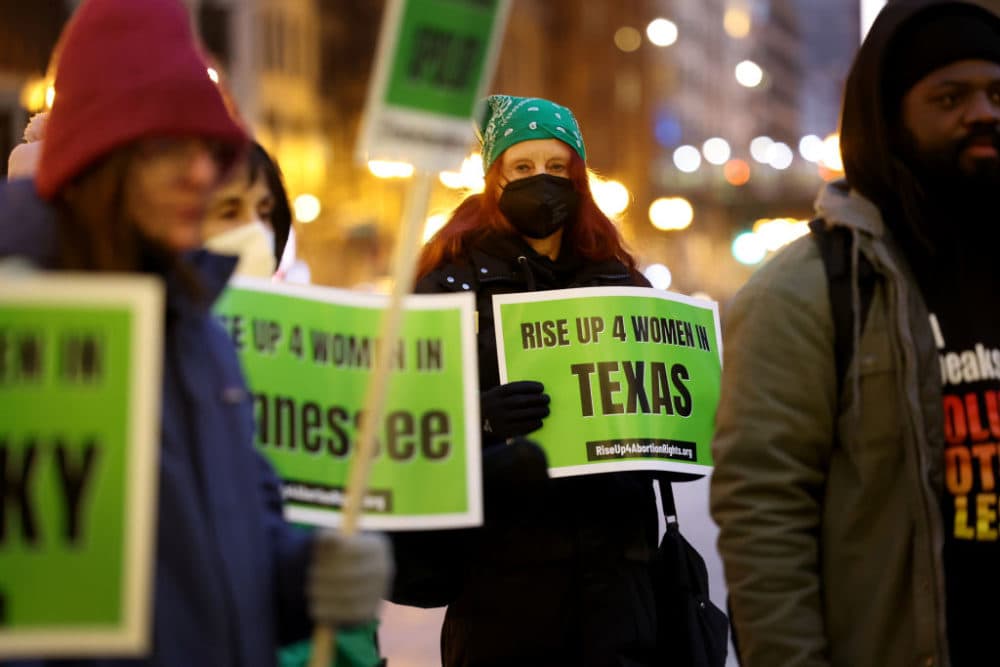Advertisement
Commentary
Roe’s bittersweet 50th anniversary

A few days before the bittersweet 50th anniversary of Roe v. Wade on Jan. 22, I wanted to write about all of the encouraging developments since Roe was overturned last summer. I was going to recount how abortion motivated voters across the country last year, and about the positive outcomes of ballot questions dealing with abortion. I had my sights set on calling out the increased donations being directed toward abortion rights groups, and the state courts that have been blocking anti-abortion laws coming out of state houses.
All of these things are true, and all of them are deeply heartening.
After being consumed by the dread so many of us felt in the wake of Dobbs v. Jackson Women’s Health Organization, I wanted to cling to whatever good news I could find. But then reality set in.
Abortion-rights activists have been discussing what a post-Roe world would look like for years. The reality is meeting, if not exceeding, so many of those dystopian predictions.
The bans and restrictions we warned of abound. Thirteen states have outright bans on abortion, and many have enacted these bans without exceptions for rape or incest. More still have gestational limits in place. An additional six states have attempted bans only to have those bans blocked by judges, and even more are expected to seek bans soon. According to the Guttmacher Institute, the totality of these bans and restrictions means that “millions of people are being denied the right to bodily autonomy and access to critical health care.” People who are denied access to abortion care have been found to have poorer long-term health outcomes compared to those able to obtain the care they needed.
I was going to recount how abortion motivated voters across the country last year, and about the positive outcomes of ballot questions ...
Existing inequities are reaching new depths, as expected. Overturning Roe has increased inequity in the South and the Midwest, the geographical areas with both the largest proportion of Black people and the largest number of states that have banned abortion or likely will. The New England Journal of Medicine notes that “the Dobbs decision rolls back fundamental rights for many people, and it is a direct assault on efforts to improve racial equity in health care.” The impacts are not limited to the realm of health care. The economic ramifications of the fall of Roe are also staggering.
The violence we feared is here. The hyper-heated rhetoric around abortion rights in the wake of Roe’s downfall has led to increased violence against abortion clinics. It didn’t take long for clinics to start speaking out about security concerns. In August, the Director of the FBI testified before the Senate Judiciary Committee about investigations into abortion-related domestic terrorism. Just last weekend, an abortion clinic in Illinois was the target of arson, when a fire accelerant was thrown through a window at the center. Thankfully, no workers or patients were injured. A firefighter sustained non-life-threatening injuries.
The anticipated denial of care is real. Tragic stories of people in medical distress during pregnancy who were denied care that was considered straightforward and routine in a pre-Dobbs world make headlines regularly. The Indiana woman whose Indiana doctors refused to treat her in the midst of a miscarriage and had to cross state lines to Kentucky to get the care she needed. The patient in Texas who was forced to wait until she spiked a 103-degree fever following a miscarriage to receive care, and who began to develop sepsis as a result of the delay. People’s lives are being put in jeopardy because of delayed and denied routine medical care.
The attacks on rights beyond abortion have arrived. In the months since the Dobbs ruling, Alabama has cited the decision in its effort to ban transgender health care. Arkansas is seeking to prohibit care for transgender youth. 2022 set a record for the number of anti-gay and anti-trans bills filed in state legislatures. 2023 is expected to be even worse. Anti-abortion activists are also coming for birth control. Staff at Idaho public universities may no longer recommend any forms of birth control to students, and legal experts predict that a case about birth control access could head to the Supreme Court in the coming years. It’s no surprise, but abortion was just the beginning.
What are we supposed to do in the midst of all of this suffering, staring down a bleak landscape for reproductive health for the foreseeable future?
Space constraints prevent me from detailing every single prediction-come-true. The criminalization of pregnancy outcomes. The devastating financial impact for individuals. The harm done to the overall economy. These are dark days, and more darkness looms ahead.
What are we supposed to do in the midst of all of this suffering, staring down a bleak landscape for reproductive health for the foreseeable future? The 50th anniversary of Roe is no time to give up. We can and must acknowledge the reality of the situation, and then we can and must get to work fighting back.
If you’re able, donate to abortion access funds that are helping people get the care they need. As we head into another election cycle, volunteer for state and municipal candidates in anti-abortion states who are fighting for our rights. Groups like Reproductive Equity Now, Planned Parenthood, and NARAL can point you in the right direction. Organize in your city or town to make sure that every available protection for abortion rights is in place. Reproductive Equity Now has pulled together a toolkit to help you take action. And, of course, have honest conversations about abortion with friends and family. Attend marches. Make phone calls. Send postcards. No act of advocacy is too big or too small at this crucial time.
Last year at this time, for the 49th anniversary of Roe, the air was thick with dreary anticipation of what the Supreme Court was about to do. We all suspected there would be no golden anniversary for the landmark decision that changed the course of history for half of our population. I wish we had been wrong.
Honestly assessing what these first months post-Roe have brought is not an exercise in wallowing or defeatism. Rather, it is an exercise in taking stock so that we can chart an accurate and effective path forward. So, look around. Recognize the hard, stark reality. And then commit to the work of restoring and expanding abortion rights, and protecting the jeopardized rights of our allies.
This may not be the 50th anniversary we had hoped for, but it is within our power to fight for brighter days ahead.
